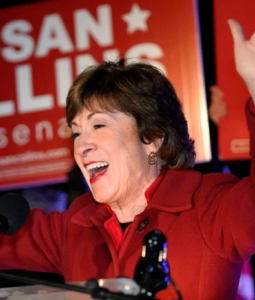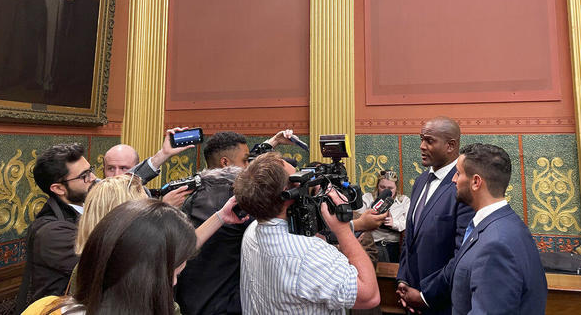Could Biden Flip Collins?
In the wake of a dramatic presidential election, the eyes of the nation turn to Georgia, where two run-off elections will decide whether President-elect Joe Biden can advance his Democratic agenda.
The obstacle: the U.S. Senate. There, Republicans have already nailed down 50 seats , now that the last races have been called in North Carolina and Alaska. The Democrats’ last hope to gain control of the Senate is to unseat incumbent Republicans David Perdue and Kelly Loeffler in Georgia’s twin Jan. 5 run-off elections.
But does the president-elect have a hidden ace up his sleeve? Could there be another tool at his disposal to help tip the balance in the Senate?
Maine Sen. Susan Collins just emerged from a bruising and costly campaign to win re-election to her fifth Senate term. Democrats and their allies reportedly outspent Collins by a 2-1 margin, in a contest in which total spending likely exceeded $200 million – more than eight times the previous record for spending in a Maine campaign.

Sen. Susan Collins
Suddenly, Collins has gone from being the most endangered Republican senator to one whose seat is secure for the next six years. She can now vote her conscience in the Senate, without fear of being primaried as a result of a tweet from President Trump.
But will she remain a Republican? Or might she join her fellow Maine senator Angus King, an independent who caucuses and mostly votes with the Democrats?
There’s no question but that Collins has been placed in an uncomfortable spot as her party moved rightward. A classic moderate Yankee Republican, she is the last of a breed in many respects – the last congressional Republican in all of New England, she has been attacked from the right for deviating from Republican orthodoxy and from the left for her “spineless” refusal to stand up to the president when it mattered most, such as during his impeachment trial.
During the campaign she said it was the “height of sexism” to suggest that her vote was controlled by either President Trump or Senate Majority Leader Mitch McConnell. On Oct. 27 Collins was the only GOP senator to vote against confirming Amy Coney Barrett to the Supreme Court, and she said the decision to name the late Justice Ruth Bader Ginsburg’s replacement should be left to the next president. She meanwhile refused both to voice support for the president or to campaign against his Democratic opponent.
Through it all, however, she has remained a staunch Republican. But she also has a very close Democratic friend from her 23 years in the Senate: President-elect Joe Biden.
Biden and Collins served together for over a decade in the Senate before Barack Obama tapped him as his running mate in 2008. Biden surprised Collins after her re-election by calling to congratulate her. Collins later became only the fourth Republican in the U.S. Senate to in turn congratulate Biden on his victory.
“First, I would offer my congratulations to President-elect Biden on his apparent victory – he loves this country, and I wish him every success,” Collins said in a prepared statement. She went on to state that presidential transitions are important and that “the President-elect and the Vice-President-elect should be given every opportunity to ensure that they are ready to govern on January 20th.”
Evidence of their long friendship abounds. When Biden’s son Beau died from brain cancer in 2015, Collins both called Biden with her condolences and issued a public statement saying her “heart aches” for the Biden family. She also called it an article of faith “among those of us who know and love Joe” that nothing is more important to him than family.
In 2016, a year in which Collins also refused to endorse Trump (instead penning instead a controversial August 2016 newspaper column in which she called him “unworthy” of becoming president), she praised Biden from the Senate floor as he prepared to leave office, calling him “a breath of bipartisan fresh air” and “everybody’s friend — but nobody’s fool.” It is often said, she added, “that if you don’t love Joe Biden … you may have a serious problem.”
Biden in turn lavished praise upon Collins the following year as “a woman of incredible character, integrity and grace,” and said he had been lucky to call Collins a friend “for a long, long time.” “I’m crazy about her,” Biden added. “For years, we’ve been hanging out together,” adding that “we share a core set of values.”
Collins is also friendly with Biden’s running mate, Kamala Harris, with whom she served for the past four years in the Senate.
If Biden were to succeed in wooing Collins away from the Republican Party, she would not be his first such prize. Biden was termed the “pesterer-in-chief” behind Pennsylvania Sen. Arlen Specter’s decision to switch parties in 2009, after reportedly calling him 14 times to persuade him to switch allegiances.
Biden’s persistent lobbying of Collins at the start of the Obama presidency is credited with getting her support for the president’s $838 billion economic stimulus package and for the administration’s signature piece of legislation, the Affordable Care Act. Besides Specter, the only Republican senators to support the 2009 stimulus package were Collins and fellow Maine Republican Sen. Olympia Snowe, whom Biden also lobbied.
Of course, if Democrats lose both of the Georgia Senate run-offs, flipping Collins would not be enough to take control of the Senate, as it would leave the GOP with a bare 51-49 advantage — one that makes Collins pivotal to every partisan Senate vote.
Also, accepting Collins into the Democratic fold would be difficult for many Mainers, so soon after the fierce and costly campaign to defeat her. But if it helped turn the Senate and gave a President Biden the votes he needs to pass Democratic reforms, all might be forgiven soon, even in her home state.



